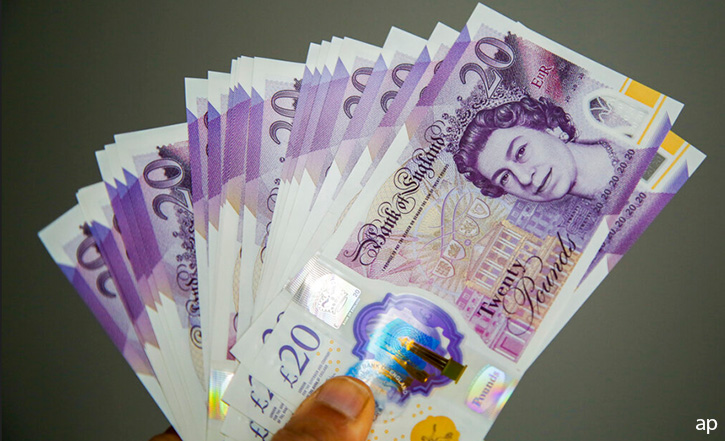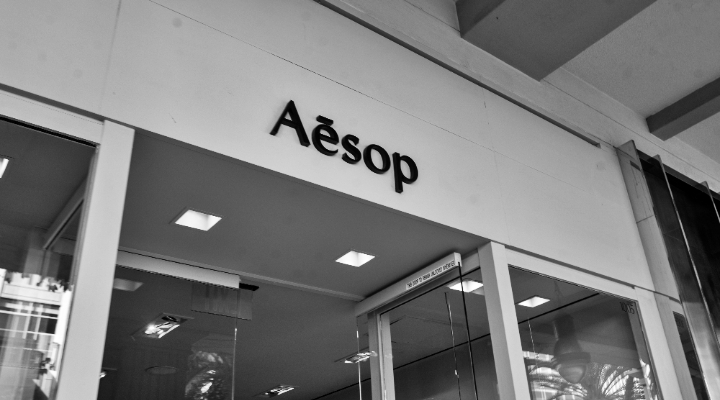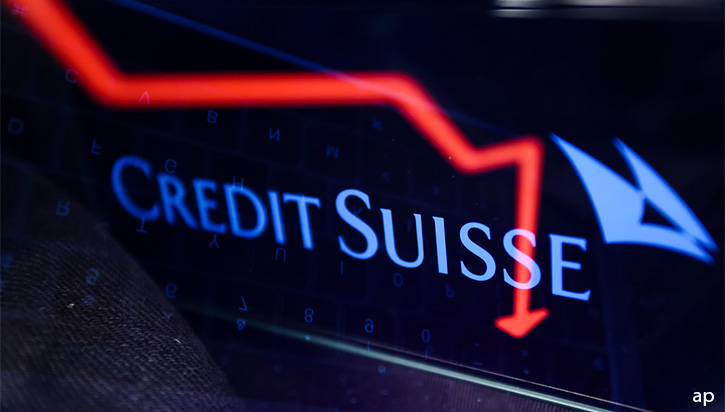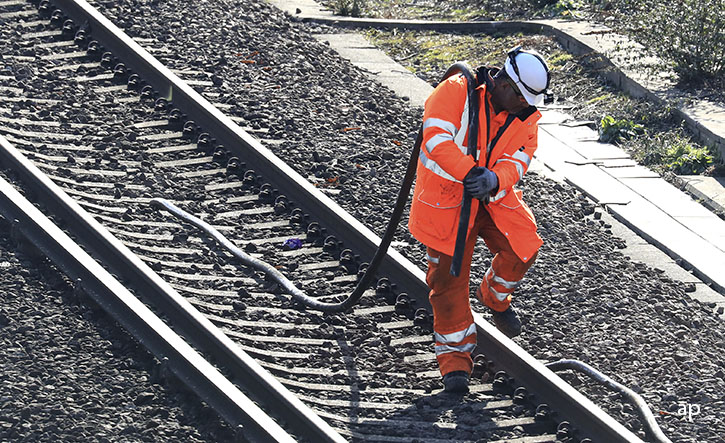
Not Even Making Money Makes Money
Times are certainly tough when the company that literally makes money is no longer making money – well, not as much as it used to anyway. De La Rue manufactures a third of the world’s banknotes, and the company this week warned that profits would be ‘below expectations’ this year. Demand for bank notes fall to its lowest level for 20 years thanks to more people using debit cards and contactless payments after a pandemic which drove people away from cash. De La Rue, which has been in business for 200 years, is now in talks with banks about its loan agreements, but, the currency company still said it was on track to make a profit of around £20 million this year. The company prints all the UK’s bank notes, produced in a site in Debden, Essex.
Will BoE Protect More of Our Money?
The Bank of England may increase the protection offered to savers amid ongoing uncertainty in the banking sector. Governor Andrew Bailey has told the IMF the bank is looking at whether the UK needs a more robust safety net for savers, and whether banks should hold more cash to bolster stability. If a bank fails, deposits up to £85,000 are guaranteed by the Financial Services Compensation Scheme (FSCS). This is considerably less than the $250,000 (£200,000) protected in the US. Bailey sought to provide a reassuring tone, saying he did not think we were heading to a 2008-style crisis, but he did point out that the digital ecosystem has created vulnerabilities, with bank runs able to go further, much more quickly. The March run on Silicon Valley Bank is described by some as the fastest bank run in history. But there is caution in the government about the potential cost of extending this safety net too far, with chancellor Jeremy Hunt reiterating that the government would not provide an ‘unlimited’ state guarantee on bank deposits.
IT Head Individually Fined for TSB Meltdown
It’s not often financial regulators hand out fines to individuals. TSB's former head of IT has been hit with a £80,000-plus penalty after its new computer system hindered millions of customers from withdrawing their money at cashpoints, leaving bank branches in chaos. The meltdown occurred in 2018 and TSB admitted its systems weren’t operating as normal until 2021. As a result. the Prudential Regulatory Authority (PRA) imposed the fine on Carlos Abarca for failing to meet the standards required of senior managers in the industry. Abarca is one of just a few individuals who have been fined for such breaches since these rules were introduced after the 2008 financial crash, amid a desire to ensure bank bosses were held accountable for their actions.
The Return of the 100% Mortgage
Skipton Building Society is developing a new ‘deposit-free' mortgage product to help Generation Rent onto the housing ladder. There is no doubt huge pent-up demand for such a product from those who don’t have the bank of mum and dad to fall back on and struggle to save for a deposit amid spiralling rents and rising house prices. Skipton says many effectively get ‘trapped’ paying rent, so it wants to take into account longer-term rental payment history when assessing suitability for a home loan. But, in the current market, the launch of a 100% mortgage could prove controversial, particularly as most housing analysts are expecting property prices to fall over the next couple of years, raising the spectre of negative equity. The new product also needs approval from regulators, which might be tricky given the, er, nervousness around financial stability in the banking system. Some of us may remember the role that Northern Rock’s 125% home loans and US sub-prime mortgages played in the last financial meltdown.
Is Tupperware’s Fate Sealed?
Has Tupperware — like Sellotape and Hoovers — become the victim of its own success? The 77-year-old company has warned it will go bust unless it can raise investment. Although Sellotape and Hoovers are still manufactured, neither exist as a stand-alone company. All three were once iconic, hugely profitable brands that became synonymous for plastic storage, sticky tape and vacuum cleaners, something which perhaps diluted their USP. Most of us still have a cupboard of mismatched plastic boxes and lids, for example, but they are more likely to be cheaper version from Tesco, Ikea or some obscure Amazon brand than actual Tupperware. The most surprising thing we learned this week about the company’s decline is that ‘Tupperware parties’ – which helped drive turbo-charge sales in the 1950s and 60s – didn’t stop in the UK until 2003. Who knew?
Every Little Doesn’t Help Tesco
The UK’s biggest supermarket saw profits halve amid spiralling food inflation. Although consumers have seen their grocery bills rise sharply, Tesco’s latest annual results suggest these increases could have been far steeper, but supermarkets are absorbing some of these costs. Over the last year, Tesco has seen a 7% increase in sales, but its profits dropped by 51% thanks to higher supplier prices, on top of rising energy and labour costs. However, this still gives Tesco healthy profits of around £1 billion, something which has led to calls from some campaigners that it could be doing more to help lower income households with food bills. Publishing these results, the supermarket’s CEO said he was expecting prices to continuing rising in the first half of 2023, but then to ‘moderate’.
Premier League Places Minimum Bet Against Gambling
The Premier League, perhaps better known for its love of money-making opportunities than business ethics, has taken a stance when it comes to sponsorship deals from betting firms. The only problem is that it is not a particularly firm one, given the growing problem of gambling addiction among young men, and the number of major gambling firms that have recently been hit with regulatory fines for poor practices. The names and logos of betting firms will be banned from the front of match day shirts, but not until the start of the 2026/27 season. So, the betting firms that currently sponsor shirts at eight Premier League clubs – including Everton, West Ham and Newcastle – can carry on for the rest of this season, next season and the following one. Even after this date logos can appear in “other areas” such as shirt sleeves and pitch-side hoardings. The move that has been described as “incoherent” by some campaigners, who would like to see ties severed between topflight football and the gambling industry.
Thousand Questions Unanswered About AI
Some might be urging caution when it comes to the rapid development of artificial intelligence, but it seems unlikely there will be a global curb anytime soon, with Alibaba on the verge of launching its own version of the popular ChatGPT product. The technology group, probably best known as for developing the Chinese version of eBay, says its new AI tool will be called Tongyi Quanwen – which roughly translates as “seeking an answer by asking a thousand questions”. The tool will be added to Alibaba’s workplace messaging app, as well as being integrated into its smart speaker. Although initially it will be concerned with tasks such as turning conversations in meetings into written notes, there is clearly concern about the potential of generative AI, which is learning from vast swathes of data to create new content. Last month a number of high-profile tech-based businessmen – Including Elon Musk and Steve Wozniak – warned that the race to develop AI systems was getting out of control.
Twitter Sued by Former C-Suite, Canine CEO Quivers
It’s been another busy week for Elon Musk, who seemed to be everywhere all at once again. It emerged that Twitter is being sued for $1 million by three former executives, fired on the day Musk took over the social media platform. Former CEO Parag Agrawal, CFO Ned Segal and head of legal and policy Vijay Gadde claim they have spent more than $1 million in legal bills relating to their roles Twitter in government and regulatory investigations, but to date these have not been refunded by their former employer. Still, perhaps Twitter will be able to pay these bills after partnering with online trading group eToro, which has around 32 million global users. This perhaps fits in with Musk’s stated vision to turn Twitter into ‘the everything app’. Sadly, we didn’t learn much more about how he plans to do this in a relatively rare TV interview this week, in which Musk reportedly only gave the BBC 20 minutes notice. He admitted taking over Twitter had proved challenging, but when questioned on whether he would follow through on his promise to step down, after a Twitter poll, he claimed in classic Musk top banter style that his dog was now in charge anyway.
Airing the World’s Most Expensive Shoes
The world’s most expensive shoes are not a pair of diamond-encrusted Manolo Blahnik stilettos but a second-hand pair of sneakers worn by basketball legend Michael Jordan. His signed back and red trainers, given to a ball boy after a 1998 NBA Finals game, were sold last week at Sotheby’s for $2.2 million (£1.7 million), the highest price paid for a pair of shoes. Michael Jordan is widely credited with starting the trainer culture after signing a deal with Nike in the early 1980s to launch its Air Jordan range – a story depicted in Ben Affleck’s new film Air, currently showing in a cinema near you. The trainers under the hammer at Southey’s were a pair of Air Jordan XIIIs which the auction house said confirmed Jordan was not only the stellar athlete of his generation but remained one of the most ‘collectible’ sports stars when it came to memorabilia.





























